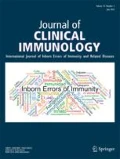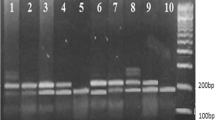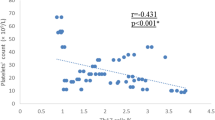Abstract
Idiopathic thrombocytopenic purpura (ITP) is a disease putatively relating to abnormal immune function and auto-antiplatelet immunoglobulin. We examined whether polymorphism of CD72, an inhibitory receptor of B cells, affect the susceptibility to ITP, or associated with the clinical characteristics of ITP. A case-control study was carried out in 206 Chinese ITP patients and 169 healthy controls. The detection of variable number of tandem repeats in CD72 intron 8 was performed by polymerase chain reaction and subsequent analysis with polyacrylamide gel electrophoresis. We did not find direct association between CD72 genotypes and susceptibility to ITP. The haplotype that contained one repeat of 13 nucleotides in intron 8 (designated as *1, and haplotype containing two repeat of 13 nucleotides in intron 8 is designated as *2) was significantly associated with early first onset age (≤14) in ITP patients (P = 0.03). ITP patients with CD72*1\*1 and *1\*2 genotype had a 3.09-fold [95% confidence interval (CI), 1.32~7.25] and 1.98-fold (95%CI, 0.92~4.25) increased risk of appearing ITP manifestation at their childhood respectively. The haplotype CD72*1 is apparently a risk allele, whereas CD72*2 a protective allele for child-onset of ITP disease.
Similar content being viewed by others
References
Cines DB, Blanchette VS. Immune thrombocytopenic purpura. N Engl J Med 2002;346:995–1008.
Yang R, Han ZC. Pathogenesis and management of chronic idiopathic thrombocytopenic purpura: an update. Int J Hematol 2000;71:18–24.
Zhou B, Zhao H, Yang RC, Han ZC. Multi-dysfunctional pathophysiology in ITP. Crit Rev Oncol Hematol 2005;54:107–16.
Berchtold P, Wenger M. Autoantibodies against platelet glycoproteins in autoimmune thrombocytopenic purpura: Their clinical significance and response to treatment. Blood 1993;81:1246–50.
Hou M, Lv B, He Q, Lu L, Shi Y, Ji X, et al. Both splenic CD5(+) B and CD5(−) B cells produce platelet glycoprotein-specific autoantibodies in chronic ITP. Thromb Res 2003;110(1):1–5.
Kuwana M, Okazaki Y, Kaburaki J, Ikeda Y. Detection of circulating B cells secreting platelet-specific autoantibody is useful in the diagnosis of autoimmune thrombocytopenia. Am J Med 2003;114(4):322–5.
Ogawara H, Handa H, Morita K, Hayakawa M, Kojima J, Amagai H, et al. High Th1/Th2 ratio in patients with chronic idiopathic thrombocytopenic purpura. Eur J Haematol 2003;71:283–8.
Panitsas FP, Theodoropoulou M, Kouraklis A, Karakantza M, Theodorou GL, Zoumbos NC, et al. Adult chronic idiopathic thrombocytopenic purpura (ITP) is the manifestation of a type-1 polarized immune response. Blood 2004;103:2645–7.
Andersson PO, Olsson A, Wadenvik H. Reduced transforming growth factor-beta1 production by mononuclear cells from patients with active chronic idiopathic thrombocytopenic purpura. Br J Heamatol 2002;116:862–7.
Kalwak K, Gorczyńska E, Wójcik D, Toporski J, Turkiewicz D, Slociak M, et al. Late-onset idiopathic thrombocytopenic purpura correlates with rapid B-cell recovery after allogeneic T-cell-depleted peripheral blood progenitor cell transplantation in children. Transplant Proc 2002;34(8):3374–7.
Gesundheit B, Cividalli G, Freeman A, Yatziv S, Koren G, Baruchel S. Cyclosporin A in the treatment of refractory immune thrombocytopenia purpura in children. Eur J Haematol 2001;66(5):347–51.
Zver S, Zupan IP, Cernelc P. Cyclosporin A as an immunosuppressive treatment modality for patients with refractory autoimmune thrombocytopenic purpura after splenectomy failure. Int J Hematol 2006;83(3):238–42.
Patel K, Berman J, Ferber A, Caro J. Refractory autoimmune thrombocytopenic purpura treatment with Rituximab. Am J Hematol 2001;67(1):59–60.
Zaja F, Iacona I, Masolini P, Russo D, Sperotto A, Prosdocimo S, et al. B-cell depletion with rituximab as treatment for immune hemolytic anemia and chronic thrombocytopenia. Haematologica 2002;87(2):189–95.
Cooper N, Stasi R, Cunningham-Rundles S, Feuerstein MA, Leonard JP, Amadori S, et al. The efficacy and safety of B-cell depletion with anti-CD20 monoclonal antibody in adults with chronic immune thrombocytopenic purpura. Br J Haematol 2004;125(2):232–9.
Taube T, Schmid H, Reinhard H, von Stackelberg A, Overberg US. Effect of a single dose of rituximab in chronic immune thrombocytopenic purpura in childhood. Haematologica 2005;90(2):281–3.
Michael RG. To make antibodies or not: signaling by the B-cell antigen receptor. Trends Pharmacol Sci 2002;23:316–24.
Valerie K, Sara F, Georges L, et al. Antigens varing in affinity for the B cell receptor induce differential B lymphocyte reponses. J Exp Med 1998;188:1453–64.
Rock KL, Benacerraf B, Abbas AK. Antigen presentation by hapten-specific B lymphocytes. Role of serface immunoglobulin receptors. J Exp Med 1984;160:1002.
Tony HP, Parker DC. Major histocompatibility complex-restricted polyclonal B cell responses resulting from helper T cell recognition of anti-immunoglobulin presented by small B lymphocytes. J Exp Med 1985;161:223.
Casten LA, Kaumaya P, Pierce SK. Enhanced T cell responses to antigenic peptides targeted to B cell surface Ig, Ia or class I molecules. J Exp Med 1988;168:171.
Lars N. The role of CD22 and other inhibitory coreceptors in B-cell activation. Curr Opin Immunol 2005;17:290–7.
Pan C, Baumgarth N, Parnes JR. CD72-deficient mice reveal nonredundant roles of CD72 in B cell development and activation. Immunity 1999;11:495–506.
Adachi T, Wakabayashi C, Nakayama T, Yakura H, Tsubata T. CD72 negatively regulates signaling through the antigen receptor of B cells. J Immunol 2000;164:1223–9.
Adachi T, Wienands J, Wakabayashi C, Yakura H, Reth M, Tsubata T. SHP-1 requires inhibitory co-receptors to down-modulate B cell antigen receptor-mediated phosphorylation of cellular substrates. J Biol Chem 2001;276:26648–55.
Wakabayashi C, Adachi T, Wienands J, Tsubata T. A distinct signaling pathway used by the IgG-containing B cell antigen receptor. Science 2002;298:2392–5.
Rojas A, Xu F, Rojas M, Thomas JW. Structure and function of CD72 in the non-obese diabetic (NOD) mouse. Autoimmunity 2003;36:233–9.
Qu WM, Miyazaki T, Terada M, Lu LM, Nishihara M, Yamada A, et al. Genetic dissection of vasculitis in MRL/lpr lupus mice: a novel susceptibility locus involving the CD72c allele. Eur J Immunol 2000;30(7):2027–37.
Hitomi Y, Tsuchiya N, Kawasaki A, Ohashi J, Suzuki T, Kyogoku C, et al. CD72 polymorphisms associated with alternative splicing modify susceptibility to human systemic lupus erythematosus through epistatic interaction with FCGR2B. Human Mol Gen 2004;13:2907–17.
Wang T, Zhao H, Ren H, Guo J, Xu M, Yang R, et al. Type 1 and type 2 T cells profile in chronic idiopathic thrombocytopenic purpura. Heamatologica 2005;90:914–23.
Kumanogoh A, Watanabe C, Lee I, Wang X, Shi W, Araki H, et al. Identification of CD72 as a lymphocyte receptor for the class IV semaphorin CD100: a novel mechanism for regulating B cell signalling. Immunity 2000;13:621–31.
Li DH, Tung JW, Tarner IH, Snow AL, Yukinari T, Ngernmaneepothong R, et al. CD72 Down-Modulates BCR-Induced Signal Transduction and Diminishes Survival in Primary Mature B Lymphocytes. J Immunol 2006;176:5321–8.
Venkataraman C, Muthusamy N, Muthukkumar S, Bondada S. Activation of lyn, blk, and btk but not syk in CD72-stimulated B lymphocytes. J Immunol 1998;160:3322–9.
Venkataraman C, Lu PJ, Buhl AM, Chen CS, Cambier JC, Bondada S. CD72-mediated B cell activation involves recruitment of CD19 and activation of phosphatidylinositol 3-kinase. Eur J Immunol 1998;28:3003.
Olsson B, Andersson PO, Jernas M, Jacobsson S, Carlsson B, Carlsson LM, et al. T-cell-mediated cytotoxicity toward platelets in chronic idiopathic thrombocytopenic purpura. Nat Med 2003;9:1123–4.
Hopkins LM, Davis JM, Buchli R, Vangundy RS, Schwartz KA, Gerlach JA. MHC class I-associated peptides identified from normal platelets and from individuals with idiopathic thrombocytopenic purpura. Hum Immunol 2005;66:874–83.
Acknowledgment
This project was supported in part by grants of National Natural Science Foundation of China (30670900). Ministry of Education of China (20060023031), Ministry of Personnel of China (2006), and Tianjin Key Project for Basic Research (06YFJZJC01800). The authors would like to thank Prof. Man-Chiu Poon (University of Calgary, Canada) for critical review the manuscript.
Author information
Authors and Affiliations
Corresponding author
Rights and permissions
About this article
Cite this article
Xu, J., Lu, S., Tao, J. et al. CD72 Polymorphism Associated with Child-Onset of Idiopathic Thrombocytopenic Purpura in Chinese Patients. J Clin Immunol 28, 214–219 (2008). https://doi.org/10.1007/s10875-007-9158-z
Received:
Accepted:
Published:
Issue Date:
DOI: https://doi.org/10.1007/s10875-007-9158-z




